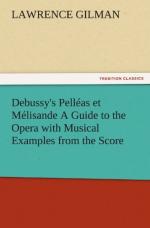ACT III
The opening scene of the third act shows the exterior of one of the towers of the castle, with a winding staircase passing beneath a window at which sits Melisande, combing her unbound hair, and singing in the starlit darkness—“like a beautiful strange bird,” says Pelleas, who enters by the winding stair. He entreats her to lean further forward out of the window, that he may come closer, that he may touch her hand; for, he says, he is leaving on the morrow. She leans further out, telling him that he may take her hand if he will promise not to leave on the next day. Suddenly her long tresses fall over her head and stream about Pelleas. He is enraptured. “I have never seen such hair as yours, Melisande! See! see! Though it comes from so high, it floods me to the heart!... And it is sweet, sweet as though it fell from heaven!... I can no longer see the sky through your locks.... My two hands can no longer hold them.... They are alive like birds in my hands. And they love me, they love me more than you do!” Melisande begs to be released, Pelleas kisses the enveloping tresses.... “Do you hear my kisses?—They mount along your hair.” Doves come from the tower—Melisande’s doves—and fly about them. They are frightened, and are flying away. “They will be lost in the dark!” laments Melisande. Golaud enters by the winding stair, and surprises them. Melisande is entrapped by her hair, which is caught in the branches of a tree. “What are you doing here?” asks Golaud. They are confused, and stammer inarticulately. “Melisande, do not lean so far out of the window,” cautions her husband. “Do you not know how late it is? It is almost midnight. Do not play so in the darkness. You are a pair of children!” He laughs nervously. “What children!”
He and Pelleas go out, and the scene shifts to the vaults in the depths under the castle,—dank, unwholesome depths, that exhale an odor of death, where the darkness is “like poisoned slime.” Golaud leads his brother through the vaults, which Pelleas had seen only once, long ago. “Here is the stagnant water of which I spoke; do you smell the death-odor?—That is what I wanted you to perceive,” insinuates Golaud. “Let us go to the edge of this overhanging rock, and do you lean over a little. You will feel it in your face.... Lean over; have no fear; ... I will hold you ... give me ... no, no, not your hand, it might slip.... Your arm, your arm! Do you see down into the abyss, Pelleas?” “Yes, I think I can see to the bottom of the abyss,” rejoins Pelleas. “Is it the light that trembles so?” He straightens up, turns, and looks at Golaud. “Yes, it is the lantern,” answers Melisande’s husband, his voice shaking. “See—I moved it to throw light on the walls.” “I stifle here.... Let us go!” exclaims Pelleas. They leave in silence.




